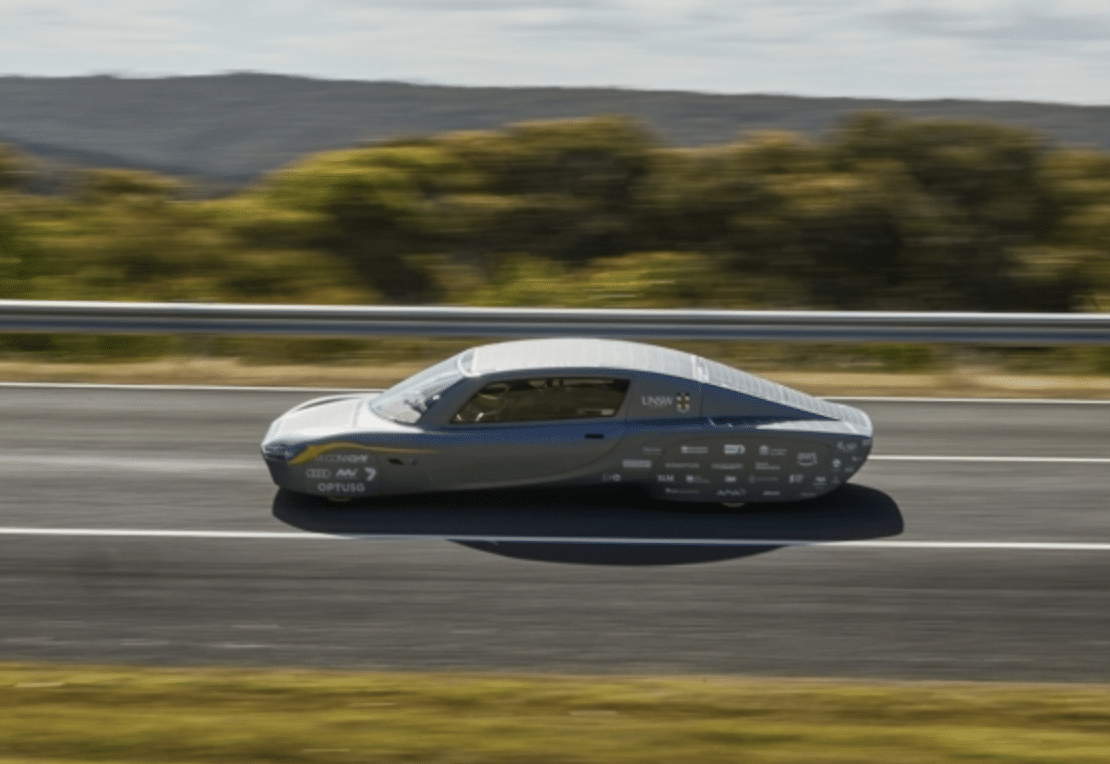Student Group Wins World Record With Speedy, Solar-Powered EV

 Why you can trust us
Why you can trust us
Founded in 2005 as an Ohio-based environmental newspaper, EcoWatch is a digital platform dedicated to publishing quality, science-based content on environmental issues, causes, and solutions.
A group of students at the University of New South Wales (UNSW) in Sydney, Australia, have proven its possible to be both speedy and sustainable.
The team’s Sunswift 7 solar-powered electric vehicle (EV) won the Guiness World Record for “Fastest EV over 1000km on a single charge.”
“It feels very weird to think that we’ve helped to make something that’s the best in the entire world,” Sunswift Team Manager and UNSW Sydney mechanical engineering student Andrea Holden said in a UNSW press release.
In order to secure the world record, the team had to drive 1,000 kilometers (approximately 621 miles) in less than 12 hours. At the Australian Automotive Research Centre (AARC) in Wensleydale, Victoria, they managed it in 11 hours and 52.08 minutes, with eight minutes to spare! During that trip, the car traveled an average of nearly 85 kilometers per hour (approximately 53 miles per hour) over a distance longer than a drive between Sydney and Melbourne.
The team received the official Guinness World Record certificate a few days later once experts had had a chance to confirm the feat.
“Two years ago, when we started to build this car, everything was going into lockdown and there were a lot of difficult moments,” Holden said in the press release. “But it’s been so rewarding to see the whole team come together and make so much progress and get us to this amazing point. It was a lot of work and a lot of hours and a lot of stress, but it’s all been worth it. This world record is validation of all the effort everyone in the team has put in.”
Sunswift 7 is the latest in a line of solar-powered electric vehicles from Sunswift Racing, which has been building these cars in Sydney since 1996, according to its website. The new car weighs 500 kilograms (approximately 1,102 pounds), about a quarter the weight of a Tesla, according to designboom. The team achieved the low weight by cutting out typical passenger-vehicle features like airbags and air conditioning. However, the speed was also helped along by the vehicle’s design.
“This team have focused on ultimate efficiency in order to break this world record,” Team Principal and UNSW Professor of Practice Richard Hopkins said in the press release. “They have shown what is ultimately achievable if you concentrate on aerodynamics, and rolling resistance and the use of smart materials.”
The car isn’t the only student-designed EV to break speed records in 2022. A team from the University of Stuttgart in Germany earned a Guinness World Record for building an EV that accelerated from zero to 100 kilometers per hour (approximately 62 miles per hour) in 1.461 seconds on 23 September 2022.
While speedy EVs like these won’t end up on the conventional car market, the innovations behind them can still have an impact beyond racing. Hopkins said the Sunswift 7 only used 3.8 kilowatt hours of energy for 100 kilometers during the record drive, which is about a quarter of the energy used by the most efficient EVs on the market today.
“[W]e have shown that if you want to make cars more efficient, more sustainable, more environmentally friendly, then it is possible,” he said. “I used to work in Formula One and nobody thinks we’ll be driving F1 cars on the road in five or 10 years. But the technology they use in F1 really pushes the boundaries and some of that filters down [to regular vehicles] and that’s what we are trying to do with Sunswift and what this world record shows is achievable.”
Subscribe to get exclusive updates in our daily newsletter!
By signing up, you agree to the Terms of Use and Privacy Policy & to receive electronic communications from EcoWatch Media Group, which may include marketing promotions, advertisements and sponsored content.

 233k
233k  41k
41k  Subscribe
Subscribe 




